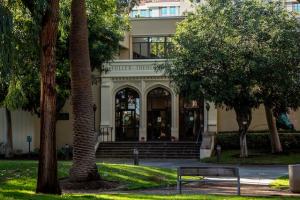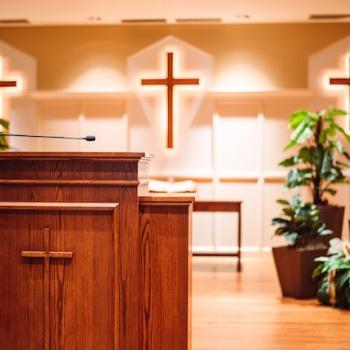When I say I didn’t have friends in seminary, I’m exaggerating. I met many wonderful people and connected more deeply with a handful of them.
But I also sensed some disconnects between myself and the “typical” seminary student (which I know is a loaded phrase in itself). I had some issues. My issues had to do with the types of theological discussions people wanted to have, our reasons for having them, and the qualities these conversations tended to carry.

Discussion or Lecture?
More than once, during a class break, I would try to spark a two-way discussion with a (usually male) classmate by asking what he thought of the lecture material we just heard—only to have this classmate spend the entire break telling me his opinions, never once pausing for feedback or asking me what I thought. Rebecca Solnit’s 2008 essay Men Explain Things to Me (published in 2015 in an essay collection also titled Men Explain Things to Me) comes to mind.
While gender was certainly at play, it was not the only thing. It was also that, perhaps, in some sense, seminary was training us to become lecturers ourselves. After all, most of our classes were lectures. And osmosis is powerful.
To the extent that this might be true, I totally hate it. I don’t think pastors are meant to go to their churches and disseminate all the knowledge they accumulated in their studies. I think they’re meant to build relationships, listen, build community, connect. I think they’re meant to live an imperfect but authentic life of faith that shows their congregation what that can look like.
Suffice it to say, I generally did not see these one-way lecturing classmates as true friends. I’m looking for friendships that are mutual. I’m looking for friendships where both parties feel—and are—respected and heard.
We Are More Than Disembodied Brains
My problem, though, wasn’t just with the dynamics of conversation. There was also a disconnect, sometimes, in terms of interests. And in motivations for these interests.
People often go to seminary because they love “theological discussions” or “theological debates.” They enjoy tossing around theological jargon. They find it fun to argue about things like Calvinism vs Arminianism (fancy words for predestination vs free will, more or less) or eschatology (a fancy word for end times, or, more generally, where humanity and the universe are ultimately headed).
If the people of God are a body (a la 1 Cor 12 and the like), then people who go to seminary may fancy themselves the brain. (Or, more precisely, the prefrontal cortex—the part of the brain considered the seat of higher-order reasoning.)
Don’t get me wrong. I’m all for brains. I did a concentration in Cognitive Science in college.
The problem, though, is when these self-proclaimed brains think they can do their brain thing divorced from the rest of the body. God made us whole embodied humans for a reason. Just as we are not disembodied spirits, neither are we disembodied minds.

We are whole. We are complex. We are heart and soul and passion. We are legs and arms and livers and stomachs. We are skin, hair, eyes, mouths, ears. We are families, friends, neighborhoods, communities. We are cities, states, nations. We are residents of planet Earth, interconnected with soil and microbes and plants and animals.
If a theological discussion isn’t about any of these things, then it doesn’t feel right to me.
Theological Discussions for Those With Their Backs Against the Wall
I want theological discussions to be real stuff for whole human beings. And I especially want these conversations to carry real, felt importance for human beings who have been marginalized.
Pastor and theologian Howard Thurman wrote in Jesus and the Disinherited about “the masses of men” who “live with their backs constantly against the wall.” What, Thurman asks, does Christianity mean for them? What could it have to offer? Thurman grapples with religion on behalf of—and alongside—“the poor, the disinherited, the dispossessed.”
Under the brutal unchecked capitalist system we live in, lots and lots of people live with their backs against the wall—although certainly some more than others. And those who are most vulnerable are often those most impacted by racism, sexism, and other systemic biases.
What hope does Jesus offer? How does God invite us to live? These are the real questions. No fancy theological jargon needed.
I don’t want to talk about abstract theological concepts just for the sake of doing so. There is too much injustice, violence, and suffering in the world. I want our theology to make a difference. I want our theology to actively do good.
Conversations Marked by Care
Sometimes in seminary—and after seminary, too, when I move in circles among people who have a seminary education—I’ve felt like people engage in theological debates to prove that they are right. To show they’re smarter, or more thoughtful, or more well-read, or holier, or some combination of these things.
To the extent that this characterization might be true—and it certainly is not true of everyone all the time—it is not the kind of space I’m interested in being a part of. I’m not interested in trying to one-up others theologically. I’m not interested in trying to win an argument for winning’s sake.
I am interested in being part of conversations that are marked by mutual care, equality, and respect. Really, conversations that are marked by love—by a kind of love that holds the qualities bell hooks describes in All About Love: “care, affection, recognition, respect, commitment, and trust, as well as honest and open communication.”
In these kinds of conversations, we are open to learning, open to changing. This is good.
Doesn’t that all sound like good ground—even sacred ground—for God-talk to stand on? This is the kind of space I want to be a part of, the kind of space I want to help build.
Being Myself and Respecting Others
I hope this serves as a helpful preface for the reflections I’ll be sharing on things I’ve changed my mind about. I’m not interested in trying to coerce—or even persuade—everyone to think the same way I do. I am interested in speaking my mind—and listening well as others do the same.
I’m interested in, as Brené Brown put it in Atlas of the Heart, “be[ing] myself and respect[ing] others for being authentic.” I’m interested in learning and growing together.
This is the spirit I hope to bring to this space as I share my journey—even (and especially) as I share my opinions, some of which are quite strong. I hope we can have a different kind of conversation—a loving one, a respectful one, an embodied one. One that is always mindful of those with their backs against the wall. I hope you’ll join me in this space.












